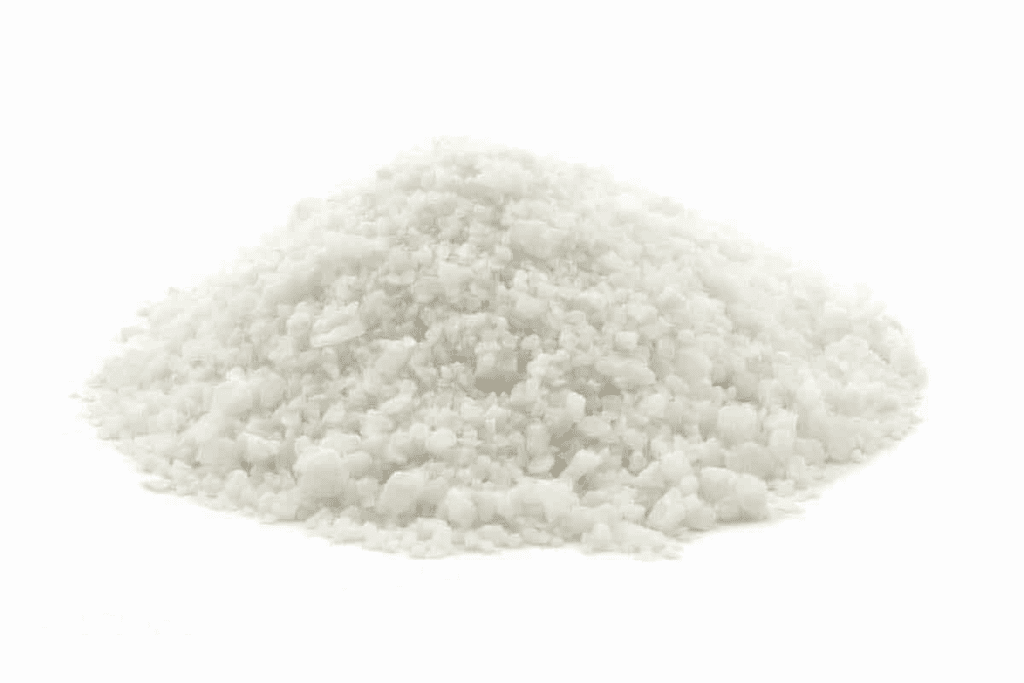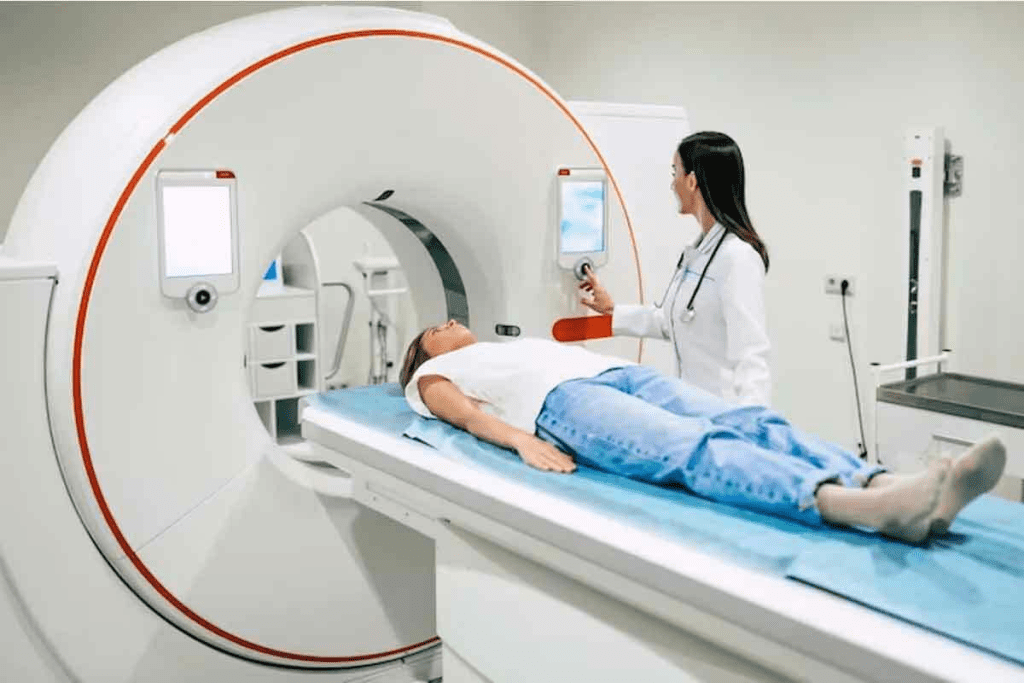
Do You Get PET Scan Results Straight Away? Understanding How Long a PET Scan TakesWhen you’re getting ready for a CT scan, knowing about the barium contrast side effects is key. Barium sulfate is a common contrast agent used to improve imaging clarity, especially in gastrointestinal exams. Side effects can include mild symptoms like stomach cramps, diarrhea, nausea, vomiting, and constipation. Serious reactions such as allergic responses, difficulty breathing, or swelling are rare but require immediate medical attention. Informing medical staff about any allergies, dehydration, or intestinal issues helps minimize risks and ensures a safer CT scan experience.
At Liv Hospital, we help our patients understand the possible effects. This includes diarrhea and how to handle it.
Key Takeaways
- Barium sulfate is used to help diagnose gastrointestinal issues.
- Common side effects include nausea, vomiting, and stomach cramps.
- Diarrhea is a possible side effect of barium sulfate.
- Drinking plenty of liquids can help prevent constipation.
- Serious side effects are rare but can include severe stomach cramps and trouble breathing.
What is Barium Sulfate and How is it Used in Medical Imaging?

Barium sulfate is a key contrast agent in medical imaging. It makes internal structures more visible. It’s very useful in CT scans to see the GI tract.
Chemical Properties of Barium Sulfate
Barium sulfate is a white, odorless powder. It’s insoluble in water and has the formula BaSO4. Its insolubility is why it’s a great contrast agent. It doesn’t get absorbed by the body, giving clear images of the GI tract.
Role as a Contrast Agent in Diagnostic Imaging
Barium sulfate coats the GI tract, making it visible in CT scans. This contrast helps doctors see ulcers, tumors, and other issues. It makes diagnostic images much clearer.
- Improves visualization of the GI tract
- Helps diagnose conditions like ulcers and tumors
- Enhances the quality of CT scan images
Different Administration Methods for CT Scans
The way barium sulfate is given for CT scans varies. It can be taken orally or rectally. Sometimes, both methods are used together.
- Oral administration: The patient drinks a barium sulfate suspension before the CT scan.
- Rectal administration: Barium sulfate is introduced into the rectum through an enema.
Knowing the different ways barium sulfate is given is key. It helps prepare patients for CT scans and improves diagnostic results.
The Purpose of Contrast Agents in CT and CAT Scans

In CT and CAT scans, contrast agents are key for clear images. They help show the differences between body parts. This makes it easier to spot health issues.
How Contrast Agents Enhance Imaging Quality
Agents like barium sulfate absorb X-rays, making areas appear white on scans. This contrast helps find problems like tumors or inflammation. Using barium for a CT scan helps see the GI tract well.
Specific Benefits of Barium Sulfate for GI Tract Visualization
Barium sulfate coats the GI tract for detailed views. It’s great for spotting ulcers, tumors, or other issues. The CT scan barium method is often used for this.
Types of Diagnostic Procedures Using Barium
Barium sulfate is used in many tests. These include:
- Barium swallow (esophagram)
- Barium meal
- Barium follow-through
- Barium enema
Each test looks at different parts of the GI tract. This gives a full view of the digestive system.
| Procedure | Area of GI Tract Visualized | Diagnostic Use |
| Barium Swallow | Esophagus | Diagnose esophageal disorders |
| Barium Meal | Stomach and small intestine | Assesses gastric and small intestine conditions |
| Barium Follow-Through | Small intestine | Examines the small intestine for abnormalities |
| Barium Enema | Colon and rectum | Detects colon and rectal diseases |
Barium Contrast Side Effects: Overview and Prevalence
When you have a CT scan with barium sulfate, knowing the side effects is key. Barium contrast agents help see the digestive tract better. But, arium sulfate can cause side effects, from mild to severe.
Mild and Common Reactions
After a barium contrast, mild side effects are common. You might feel nausea, vomiting, stomach cramps, diarrhea, and constipation. Most people only get mild symptoms that go away in a few days.
Some might notice temporary changes in bowel movements. This is because of how barium sulfate affects the digestive system.
Moderate Side Effects
Moderate side effects can be uncomfortable but are usually not serious. You might feel abdominal pain, bloating, or allergic reactions like hives or itching. These symptoms can often be treated with over-the-counter meds or home remedies.
It’s important to listen to your doctor’s advice on how to manage these symptoms.
Severe Adverse Reactions
Severe reactions to barium contrast are rare but can be dangerous. These include severe allergic reactions, bowel obstruction, or barium peritonitis. People with certain health issues or allergies are more at risk.
In summary, while barium contrast agents are mostly safe, knowing the possible side effects is important. Understanding these can help you prepare for the procedure and know what to expect during recovery.
Does Barium Sulfate Cause Diarrhea? Examining the Evidence
Barium sulfate is used in medical imaging, like CT scans. It can cause side effects in the stomach and intestines. People often wonder if it leads to diarrhea.
We’ll look at how common diarrhea is after using barium. We’ll also explore why it happens and how to handle it.
Prevalence of Diarrhea After Barium Procedures
Diarrhea is a known side effect of barium sulfate. It happens because the substance is in the gut. Many patients get stomach problems, including diarrhea, after these tests.
How often diarrhea happens can depend on the barium dose and the person’s health.
Key statistics on diarrhea prevalence:
- Up to 30% of patients may experience gastrointestinal side effects.
- Diarrhea is reported in a significant portion of these cases.
- The incidence can be influenced by the method of barium administration.
Mechanism Behind Barium-Induced Diarrhea
The exact reason for barium sulfate causing diarrhea is not clear. But it’s thought to be because of how barium affects the gut.
Barium sulfate can irritate the gut and disrupt its normal function. This can lead to diarrhea.
Duration and Management of Symptoms
How long diarrhea lasts after barium sulfate varies. Usually, it goes away in a few days.
To manage diarrhea from barium, staying hydrated is key. Sometimes, medications are needed to help with symptoms.
Management strategies include:
- Drinking plenty of fluids to prevent dehydration.
- Avoiding certain foods that can make diarrhea worse.
- Using anti-diarrheal medications as directed by a healthcare provider.
Knowing that barium sulfate can cause diarrhea helps patients prepare for tests. It also shows how to manage symptoms.
Constipation and Other Digestive Complications from Barium Contrast
Barium sulfate is usually safe for CT scans, but it can cause stomach issues. This includes constipation. Knowing why and how to deal with these problems is key.
Why Constipation Occurs After Barium Studies
Constipation is common after barium tests because the barium stays in the intestines. This makes stools hard and hard to pass. Drinking enough water and eating fiber can help.
Patients are told to drink lots of water and eat fiber before and after tests. This can lessen constipation risks.
White Stools: Causes and Duration
White or light-colored stools can also happen with barium sulfate. This is because barium mixes with stool. It usually goes away once the barium leaves the body.
How long white stools last varies. It depends on how fast the body moves food and how much barium was used. Stools usually go back to normal in a few days.
Managing Post-Procedure Constipation
To deal with constipation after a CT scan, try different things. This includes changing your diet, drinking more water, and sometimes taking medicine. Here are some tips:
- Drink more water to make stools softer.
- Eat foods high in fiber to help with bowel movements.
- Move around more to help your bowels work better.
- Ask a doctor about using stool softeners or laxatives.
Understanding barium sulfate’s side effects and taking action can make recovery easier. This helps avoid discomfort and ensures a smoother recovery after a CT scan.
Risk Factors for Severe Barium Sulfate Side Effects
Knowing the risk factors for severe side effects from barium sulfate is key. This helps doctors keep patients safe during CT scans. Even though barium sulfate is usually safe, some people might face more problems.
Pre-existing GI Conditions
People with certain GI issues are more likely to have serious side effects from barium sulfate. This includes inflammatory bowel disease (IBD), gastrointestinal obstruction, or severe constipation. A study in the Morbidity and Mortality Weekly Report (MMWR) shows why these conditions matter.
Doctors say it’s important to check for these conditions before using barium sulfate. This helps lower the risk of problems.
“Careful patient selection and preparation are key to reducing the risk of adverse events associated with barium sulfate.”
Allergic Reactions to Barium Contrast
Allergic reactions to barium sulfate are rare but can happen. People with allergies, or those allergic to contrast agents or barium, are at higher risk. Signs of an allergic reaction include hives, itching, swelling, or difficulty breathing. It’s important for patients to tell their doctors about any allergies before the test.
Patient Populations at Higher Risk
Some groups face a higher risk of severe side effects from barium sulfate. These include:
- Elderly patients, who may have underlying health conditions or reduced physiological reserve.
- Pediatric patients may require adjusted dosing and close monitoring.
- Patients with compromised renal function may be more susceptible to contrast-induced nephropathy.
- Pregnant or breastfeeding women require careful consideration of the risks and benefits.
Understanding these risks helps doctors take steps to avoid severe side effects. This ensures a safe and effective CT scan using barium sulfate.
Preparing for a CT Scan with Barium Sulfate
To have a smooth and successful CT scan with barium sulfate, patients need to follow certain steps. It’s important to prepare well to get clear images and avoid side effects.
Pre-procedure Instructions
Before the CT scan, patients usually need to fast for 4-6 hours. This is to make sure the barium sulfate works well without being mixed with food or drinks.
Telling your doctor about any medicines you take is also key. Some medicines might need to be changed or stopped before the scan.
Hydration and Dietary Guidelines
Drinking lots of water is important before and after the scan. It helps get rid of the barium sulfate and prevents constipation, a common side effect.
Also, eating a light meal or avoiding certain foods might be needed. Your doctor will tell you what to do to make sure the barium sulfate works properly during the scan.
| Food Type | Recommended | To Avoid |
| Meals | Light meals | Heavy or fatty foods |
| Liquids | Clear fluids | Dairy products |
| Fiber | Moderate fiber intake | High fiber foods |
What to Tell Your Healthcare Provider
Telling your doctor about your health history and any worries is very important. Make sure to mention any allergies, like to barium or other contrast agents. Also, talk about any health issues you have, like stomach problems.
It’s also important to tell your doctor about all the medicines you’re taking. This includes over-the-counter drugs and supplements, as they might affect the scan.
By following these steps and talking well with your doctor, you can have a good CT scan with barium sulfate. This way, you can avoid any bad effects.
Managing and Treating Barium Contrast Side Effects
It’s important to manage side effects after a barium contrast procedure for a smooth recovery. Barium sulfate is usually safe and works well for imaging. But some people might have bad reactions. We’ll talk about how to handle these side effects, so patients can feel better and avoid discomfort.
Immediate Post-Procedure Care
Right after a CT scan with barium sulfate, taking care of yourself is key. Drink lots of fluids to get rid of the barium from your body. This can prevent constipation and other stomach problems. Your doctor might give you special instructions based on your situation.
Following these instructions helps get rid of the barium quickly. Drinking water or other hydrating drinks is helpful. Also, watch how your body reacts to the barium and tell your doctor if you notice anything odd.
Home Remedies for Digestive Discomfort
Some people might feel stomach upset after a barium CT scan, like constipation or diarrhea. There are simple home remedies to help. For constipation, drinking more water and eating foods high in fiber can help. Your doctor might suggest laxatives, too.
For diarrhea, drinking electrolyte-rich drinks can help. Try to avoid heavy or spicy foods for a few days. If your symptoms don’t go away, talk to your doctor for advice.
| Symptom | Home Remedy |
| Constipation | Increase fluid intake, high-fiber foods, and laxatives |
| Diarrhea | Electrolyte-rich beverages, avoid heavy/spicy foods |
When to Seek Medical Attention
Most side effects from barium contrast are mild and go away on their own. But ssometsometimes youto see a doctor. Severe stomach pain, vomiting, or signs of an allergic reaction need quick medical help.
If you have ongoing constipation or diarrhea that doesn’t get better, see a doctor. It’s always safer to check with a healthcare provider if you’re worried about your symptoms.
Knowing how to deal with barium contrast side effects makes recovery easier. If you have any worries or questions, talk to your healthcare provider for advice.
Conclusion: Balancing the Benefits and Risks of Barium Contrast Procedures
We’ve looked into how barium sulfate helps in medical imaging, like in CT scans. It can cause side effects like diarrhea and constipation. But, for many, the good it does in tests is worth the possible downsides.
Barium sulfate makes CT scans better, helping doctors see the GI tract clearly. Knowing the risks and taking steps to avoid them can help patients get the most from these tests.
It’s important for patients to know both the good and bad of barium tests. Talking with their doctors helps them make smart choices. As medical imaging gets better, barium sulfate will keep being a key tool for doctors.
Deciding to have a barium test should be a thoughtful choice. By weighing the pros and cons, patients and doctors can aim for the best results together.
FAQ
What is barium sulfate used for in CT scans?
Barium sulfate is used as a contrast agent. It helps make diagnostic images clearer, mainly for the GI tract during CT scans.
Does barium sulfate cause diarrhea?
Yes, barium sulfate can cause diarrhea. The severity can vary. It’s important to talk to your healthcare provider about any concerns.
How is barium sulfate administered for a CT scan?
Barium sulfate is given orally or rectally. This depends on the specific procedure and the GI tract area being examined.
What are the common side effects of barium contrast?
Common side effects include mild diarrhea, constipation, and stomach discomfort. Rare but severe reactions can also happen.
How can I manage diarrhea caused by barium sulfate?
Drinking plenty of water and following your healthcare provider’s dietary advice can help. Sometimes, medication is prescribed to ease symptoms.
Why do some patients experience constipation after barium procedures?
Constipation can happen due to barium sulfate’s effect on bowel movements. It’s usually short-term. Hydration, dietary changes, and laxatives can help manage it.
What are the risk factors for severe barium sulfate side effects?
Those with pre-existing GI conditions, allergic reactions to barium, or certain health conditions are at higher risk. The elderly are also at risk.
How can I prepare for a CT scan with barium sulfate?
Follow pre-procedure instructions, stay hydrated, and follow dietary guidelines. Inform your healthcare provider about your medical history and any concerns.
When should I seek medical attention after a barium contrast procedure?
Seek medical attention for severe or persistent side effects. This includes severe abdominal pain, vomiting, or signs of an allergic reaction.
Can barium sulfate cause allergic reactions?
Yes, allergic reactions to barium sulfate are rare but can happen. Symptoms range from mild to severe. It’s important to report any unusual reactions to your healthcare provider.
How long do the side effects of barium sulfate last?
Side effects vary in duration. Most mild effects, like diarrhea or constipation, are short-term and last a few days. If symptoms persist, follow up with your healthcare provider.
References
- Medical News Today. (2017, April 26). Barium swallow: What to expect and side effects. https://www.medicalnewstoday.com/articles/317189



































